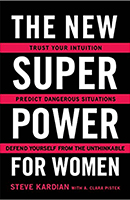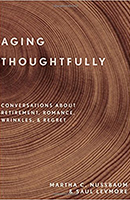 VERDICT: It’s a Keeper
VERDICT: It’s a Keeper
The New Superpower for Women: Trust Your Intuition, Predict Dangerous Situations and Defend Yourself from the Unthinkable
By Steve Kardian (New York, NY: Touchstone, 2017). 216 pgs. $11.59. Order, www.amazon.com.
Reviewed by Kerri A. Hutchison
Imagine this: You are in the parking garage of a mall one afternoon after just completing your holiday shopping. A man with his arm in a sling approaches you and asks you to help him lift a package out of the trunk of his car, which is parked in a corner of the garage. Do you assist?
According to author Steve Kardian, of the eight women on whom he tried this experiment, all eight accompanied him to a corner of the garage and helped him get the package. He had not really hurt his arm but was simply feigning injury to see how many women would respond; the fake-injury ruse was used repeatedly by serial killer Ted Bundy. How do you avoid falling for this trick? Steve Kardian’s book is designed to help women not become victims in such a scenario.
Want to Review a Book?
Please request a book and writing guidelines from Wisconsin Lawyer managing editor Karlé Lester, at klester@wisbar.org or (608) 250-6127. Reviewers may keep the book reviewed. Reviews of about 500 words are due within 45 days of receiving the book. Reviews are published, space permitting, in the order received and may be edited for length and clarity.
Kardian argues that a woman’s superpower is intuition. According to the author, women have stronger intuition than do men but are more likely to disregard their intuitive feelings than men are. His book is organized into chapters on mental aspects of self-defense, such as awareness and intuition, as well as physical aspects, such as defending yourself and presenting yourself in an assertive manner.
Kardian has spent more than 30 years in law enforcement. He weaves examples of cases in which he was personally involved throughout the book. However, the examples are sparse in the beginning chapters and more prevalent in later chapters. In addition to his years in law enforcement, Kardian is also the founder of Defend University, a company that provides self-defense training. The section of the book devoted to Defend University felt like a sales pitch and would have been better left out of the main text of the book.
Kardian devotes several sections of the book to concerns of young women, such as the risks of sexual assault on college and university campuses and staying safe during spring break. The book would have benefited from a wider array of crime scenarios. For example, all the examples assume a woman will be targeted while alone. A woman who is a victim of a carjacking may also have a young child in the car with her, but the author never addresses how to respond when other individuals are at the crime scene.
Despite the book’s focus on intuition, it does not adequately explain how to go from perception or intuition to action. For example, in a chapter on self-defense, one of the scenarios is a man walking toward a woman in a parking garage. The woman blasts the man with pepper spray. The author never addresses that a woman may hesitate to take action if she has incomplete information – perhaps she thinks the man just parked his car near hers. This is a topic that other self-defense books for women cover thoroughly.
Overall, though, this book is a valuable resource for helping women to stay safe. The specific prevention tips and actions to take when attacked serve as a reference manual for helping women to avoid becoming victims of crime.
Kerri Hutchison, Marquette 2007, is corporate counsel for Caterpillar Inc., Peoria, Ill.
 VERDICT: It’s a Keeper
VERDICT: It’s a Keeper
Aging Thoughtfully: Conversations About Retirement, Romance, Wrinkles, & Regret
By Martha C. Nussbaum & Saul Levmore (New York, NY: Oxford University Press, 2017). 251 pgs. $20.58. Order, www.amazon.com.
Reviewed by William H. Thedinga
Like the general population, the demographics of lawyers in Wisconsin have been affected by the baby-boomer bulge. With more retired and soon-to-be-retired lawyers than ever before, aging is a concern for a growing number of Wisconsin lawyers.
Aging and retirement are the subjects of Aging Thoughtfully, a book written by two members of the baby-boomer generation. The authors are University of Chicago Law School professors, one a philosopher (Nussbaum) and the other an economist and lawyer (Levmore).
The book ranges across diverse topics, suggested by its subtitle: “Conversations About Retirement, Romance, Wrinkles & Regret.” It consists of 16 essays, one by each author in each of the eight chapters.
The least satisfying parts of the book are the ones dealing with more academic, more abstract subjects. For example, the discussion about age discrimination law and policy is interesting but has little practical value for aging lawyers. The chapter about the ethics of cosmetic surgery is less interesting and not very useful.
The most satisfying passages in the book are the personal, anecdotal comments. The simple advice offered by Nussbaum is the most pertinent. She emphasizes the importance of friends and family; the need for their love and support grows as we age. Nussbaum also bluntly recommends that “aging people should … focus on emotional self-control.” And she mentions the importance of a sense of humor as we age. All are crucial reminders for confronting the challenges of aging.
Aging Thoughtfully is not a book for those seeking detailed advice about practical retirement issues, such as strategies regarding Social Security, health insurance, or retirement plan distribution. The issues addressed by the authors are larger and more general.
This is a book with more questions than answers. But the questions get you thinking. And the authors are right: Aging benefits from thoughtful consideration.
William H. Thedinga, Harvard 1973, formerly a shareholder-partner in Weld Riley S.C., Eau Claire, is now of counsel to the firm and lives south of Boston.
 VERDICT: Not For Me, Maybe For You
VERDICT: Not For Me, Maybe For You
Reality Television Contracts: How to Negotiate the Best Deal
By Paul Battista & Hayley Hughes (New York, NY: Allworth Press, 2017). 193 pgs. $19.99. Order, www.amazon.com.
Reviewed by Gail Miles Konkel
I view television from insider and outside perspectives, from experiences in my youth, in addition to professional and personal experiences in adulthood as interview subject and ad sales rep. I was raised in a media family, but I can tell you nothing in all my related experience will ever be as weird or as educational as events surrounding my 15 seconds of fame in 2011 as reality show participant on a major cable network.
Perhaps you can see why I jumped at reviewing this book. From its first cue, I can tell you one thing the book confirmed about my thankfully brief reality show experience: If you are a nobody, in the reality television business, you have no rights. Period. In fact, if a nonfamous person wants to try his or her hand at reality show participation, he or she must be prepared to give up all rights, even those one might think would be safe in a court of equity, and be prepared to relinquish those rights in perpetuity.
Networks and production companies own “no name” participants, run the show, and hold all the cards. If the show is successful, and the newcomer is instrumental in its success, he or she should be prepared to find a specialized lawyer to attempt to regain whatever rights might be returnable to the once lowly participant who might now be a reality television star. (Existing celebrities tend to fare better than participants who were mere mortals at the outset.)
While this axiom remains evident throughout the book, Reality Television Contracts in its entirety did not entertain me, though its subject matter focuses on a growing facet of the entertainment industry. It’s a book for lawyers, with few recognizable mentions beyond the law-related commentary. Almost no names are dropped nor industry gossip tattled.
Despite the lack of entertainment value for someone like me who was looking for a scoop on something I experienced firsthand, lawyers who might encounter a potential reality show participant in their practices should find this book helpful. However, the client would most likely be a nobody and, if he or she becomes a somebody, would probably seek an entertainment lawyer to negotiate for rights relinquished and now potentially returned given newfound fame.
This does not mean that lawyers who don’t focus on entertainment law should avoid this book. It is an issue-spotting, contract law-based, negotiation-focused, detail-filled primer regarding potentially cutthroat subject matter minus the dirt, though the authors do indulge in a few recognizable samples for their illustrative legal assistance.
After an introduction with a disclaimer in bold-print capital letters, the book is organized in three parts. I found Part I, including an interesting history of the genre, most to my liking. Part II contains the lawyering content and focuses specifically on contract samples and practice tips, including a deal point checklist, regarding the development stages of program creation. Part III concentrates on the production phase of reality television programming. The book ends abruptly with an index. No conclusion, no information on trends in the industry, and no personal opinions about where reality television is headed. I must admit, I felt a bit cheated given the absence of a cliff-hanger.
If I had to equate this book, a lawyer’s book minus the drama its subject matter is known for, to a television program, I would describe Reality Television Contracts as Dragnet, given its hearty “just the facts, Ma’am” approach.
Gail Miles Konkel, U.W. 1991, though not actively engaged in the practice of law, is otherwise engaged working on the occasional sales and marketing consultant opportunity, writing and editing full-length adult novels and children’s books, and enjoying volunteer work.
